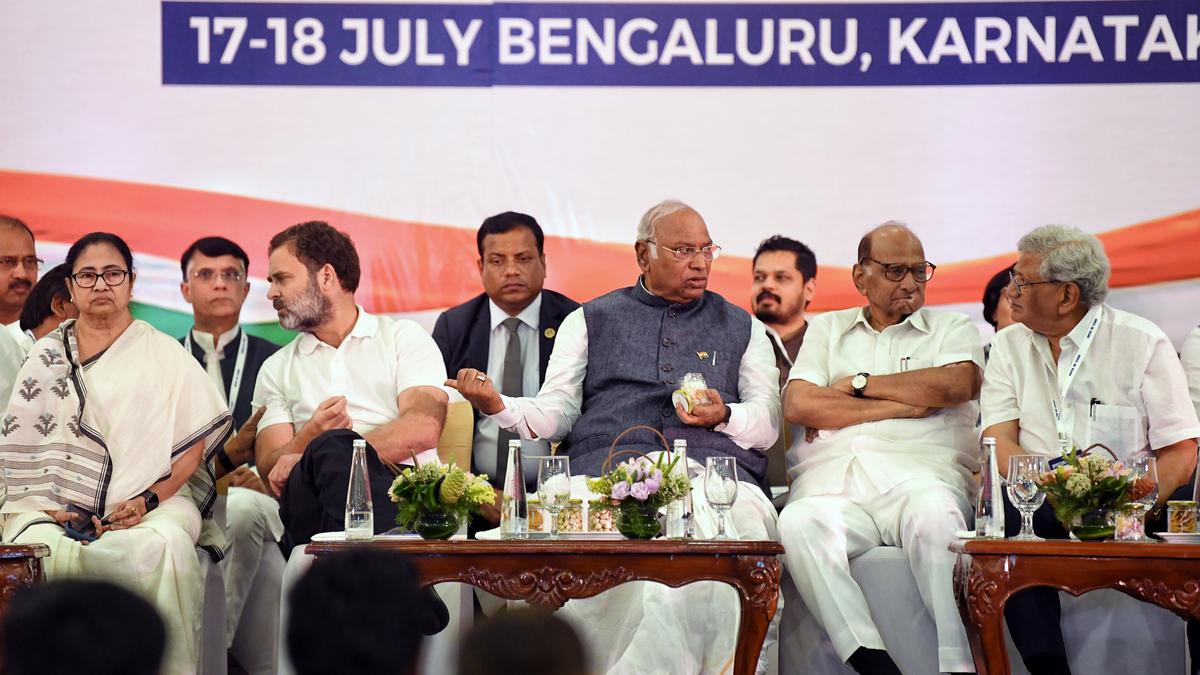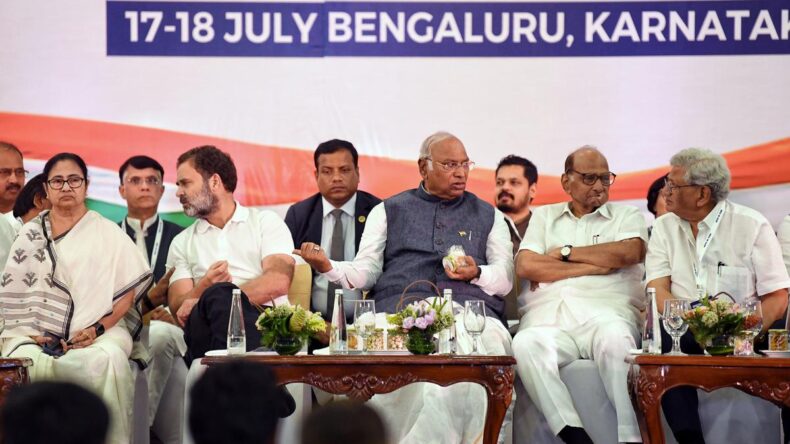26 opposition parties came together to convene an opposition meeting to discuss their trajectory for the 2024 Lok Sabha Elections. The collective alliance formed was decided to named INDIA. Bihar’s Chief Minister, Nitish Kumar, initially opposed the idea of naming the opposition front at the Bengaluru conclave as I.N.D.I.A.

He expressed concerns about the similarity between I.N.D.I.A and NDA, an alliance led by the BJP. He also highlighted the potential confusion that could arise from an opposition alliance being named INDIA. However, as the majority of parties appeared satisfied with the name, Nitish Kumar eventually relented and agreed to it.
At the Bengaluru conclave, the opposition front, which aimed to contest against the ruling BJP in 2024, was proposed to be named “I.N.D.I.A,” representing Indian National Developmental Inclusive. The announcement of this name was made by Congress President Mallikarjun Kharge. Reports attributed the suggestion of the name INDIA to various opposition leaders, including Uddhav Thackeray, Mamata Banerjee, and even Rahul Gandhi. All the opposition leaders had been asked to provide their suggestions for the name.
Opposition Meet Bengaluru
A gathering of 26 opposition parties took place in Bengaluru on Tuesday to strategize and unite against the ruling NDA alliance, led by Prime Minister Narendra Modi, in the 2024 Lok Sabha elections. The meeting resulted in a resolution by the 26 parties to protect and uphold the essence of India as enshrined in the Constitution.
During the gathering, leaders from these parties accused the BJP of deliberately eroding the foundations of our democratic system and expressed their unwavering commitment to preserving the fundamental principles of India. The collective effort, referred to as the Samuhik Sankalp, emphasized that the pillars of the Indian Constitution are being systematically and alarmingly undermined.
The leaders collectively agreed to rename the group I.N.D.I.A as the “India National Developmental Inclusive Alliance.”
Following the Opposition meeting in Bengaluru, Congress president Mallikarjun Kharge expressed to reporters that the Opposition would contest the 2024 elections together and emerge victorious. West Bengal Chief Minister Mamata Banerjee, on the other hand, challenged the NDA to face the united force of INDIA. Former party president Rahul Gandhi, a senior leader, emphasized that the Opposition’s struggle was against the ideology of the BJP. The next meeting of Opposition parties is scheduled to take place in Mumbai.
During the second day of the Opposition unity meeting in Bengaluru, Congress president Mallikarjun Kharge emphasized that the differences among the parties were not insurmountable and could be set aside for the betterment of the people. The 26-member grouping of Opposition parties decided to name their alliance for the 2024 Lok Sabha polls as INDIA (Indian National Developmental Inclusive Alliance). Kharge stated that the Opposition would fight the 2024 elections together and assured their success. West Bengal Chief Minister Mamata Banerjee challenged the NDA to confront the united force of INDIA. Former party president Rahul Gandhi asserted that the Opposition’s fight was against the ideology of the BJP. The next meeting of Opposition parties will take place in Mumbai.
During the same meeting, Mallikarjun Kharge expressed that the Congress party was not driven by a desire for power or the prime ministerial post. He acknowledged the differences among some parties at the state level but clarified that these differences were not ideological and could be set aside for the sake of the people. Kharge highlighted that the Opposition consisted of 26 parties and governed 11 states, suggesting that the BJP did not secure its 303 seats independently but relied on allies’ votes, only to disregard them later. Taking a dig at the National Democratic Alliance (NDA) meeting, he mentioned that BJP leaders were trying to reconcile with old allies by visiting various states. Kharge reiterated that the purpose of the Opposition meeting was to safeguard the Constitution, democracy, secularism, and social justice.












